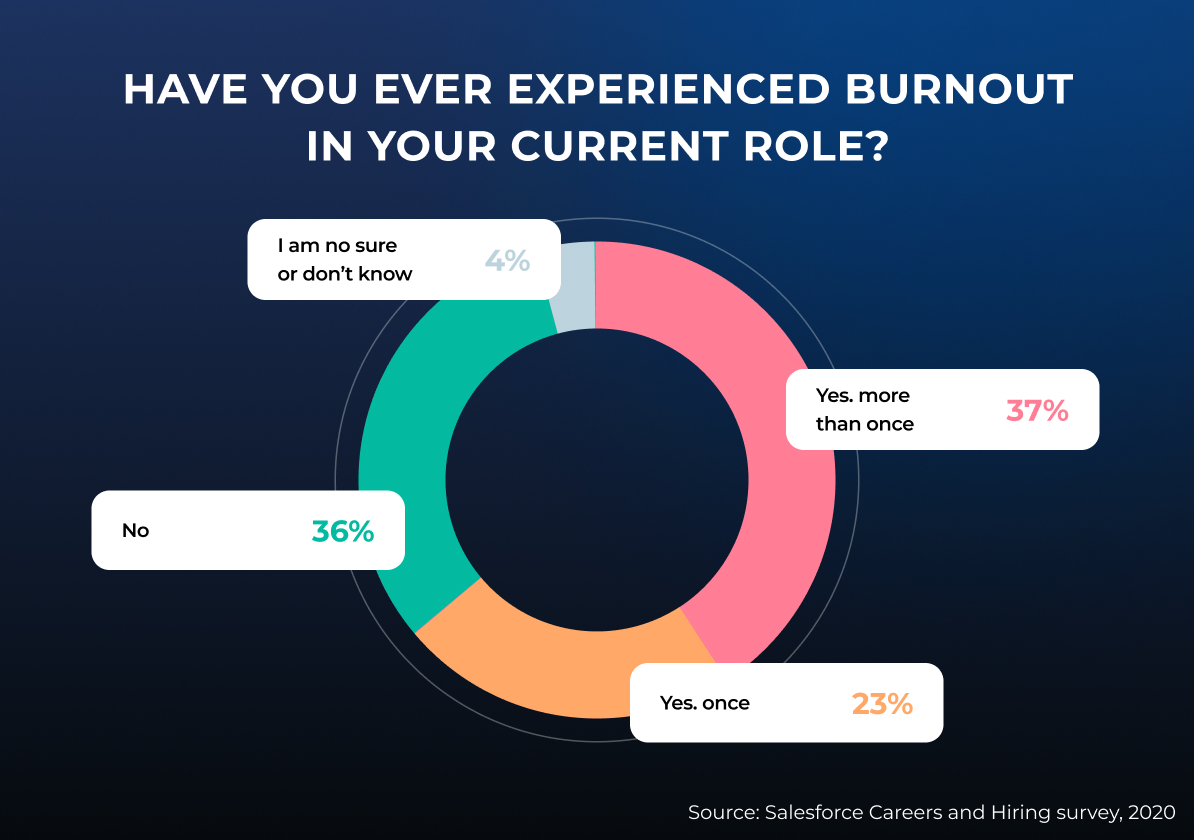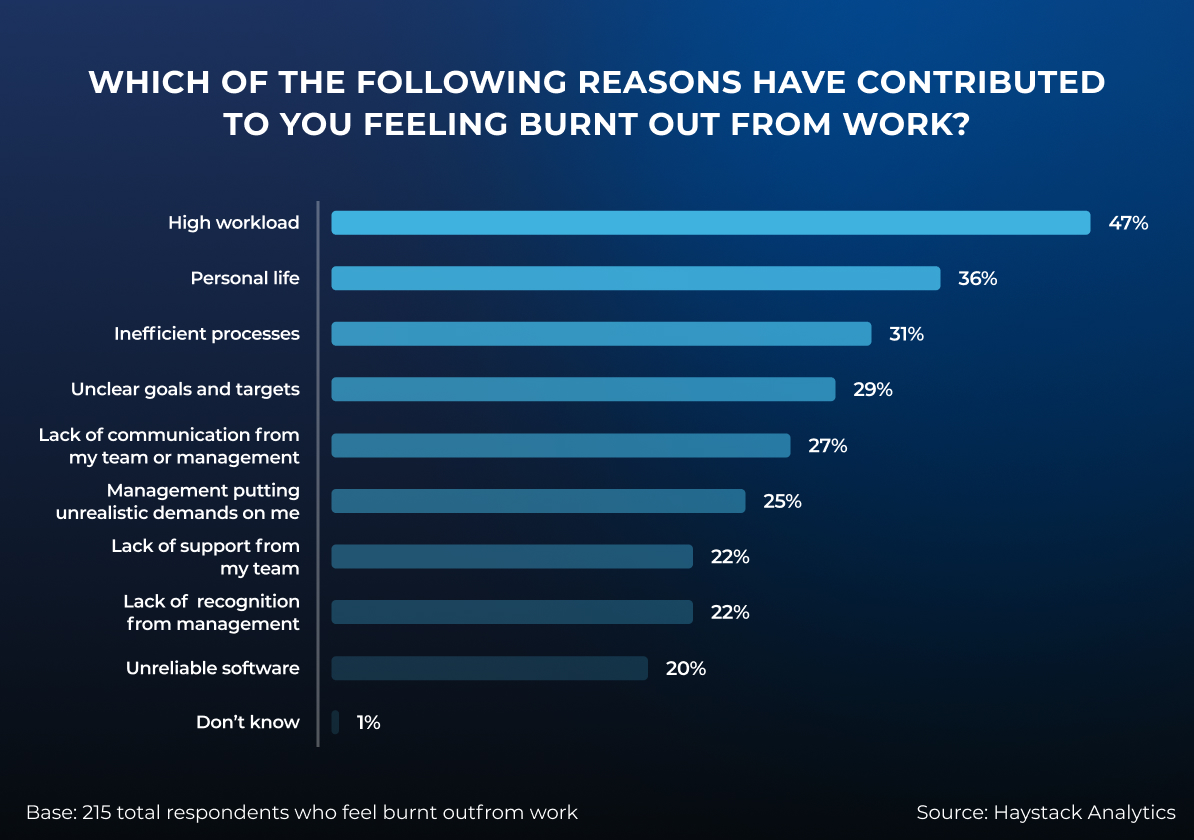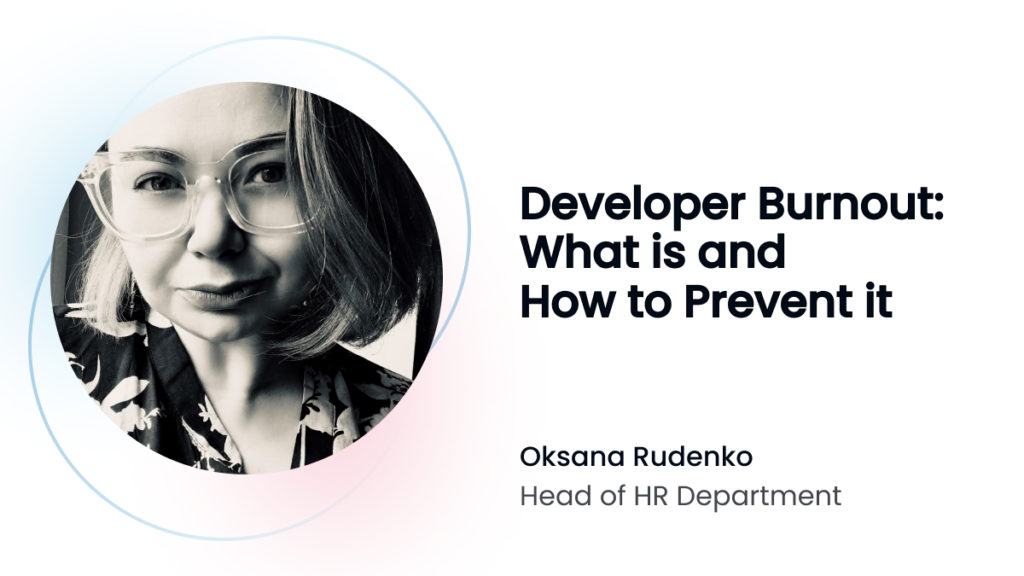Table of Contents
Any job can have stressful elements, even if you love what you do like software development. You may experience pressure to meet a deadline or to fulfill a challenging expectation. But when work stress becomes chronic, it can be overwhelming, harmful, and causes mental fatigue.

Employee burnout is a serious issue for a lot of people, including software developers and other tech workers. It leads to reduced professional efficacy, energy depletion, and poor quality of life. How to recognize early signs that you are experiencing burnout and help yourself overcome it? We will answer these questions in this article.
How Does Software Engineer Burnout Looks Like?
According to Gallup (which performs data research and analysis for corporations), over 75% of employees, with no dependency on a role, have experienced burnout. Do you think you are not one of those? Well, let us begin with a small test:
What Is the Difference Between Stress and Burnout?
Stress and burnout are two totally different states of mind, but it might be difficult to know where normal stress stops and where burnout begins.
If the stress continues for a prolonged period, it can result in burnout. When you’re stressed, you might feel tired most of the time or even fatigued. Once you are away from the stressful situation the symptoms generally dissipate quickly.
However, when someone is experiencing burnout, they are dealing with chronic exhaustion.
If a burnout formula exists, it will look the next way:
Stress → more stress → too much stress → burnout
Burnout Statistics
While the software engineer burnout rate isn’t known, the Software Developer Burnout Survey, conducted in 2020, reveals common software engineer burnout symptoms. Deloitte reported in 2015 that 77% had experienced burnout at work. 91% of respondents stated that frustration and stress had a “highly impact” on the quality of work. A staggering 83% of respondents also felt that stress and frustration had a negative effect on their personal lives. The same survey found that 70% of professionals don’t believe their employers do enough to prevent employee burning out. Jump ahead to May 2020. A Monster survey found that more than half (50%) of those who work from home experienced burnout symptoms. Two months later, this number rose to 69%. Another study done during the pandemic by FlexJobs found that workers are three times more likely to report having mental health problems than they were before the pandemic. 56% also want more flexibility in the work day. 46% think that more mental health days and less time off are the best ways to prevent employee burnout. The rate of software engineer burnout is unknown. However, the Software Developer Burnout Survey was conducted in 2020 and revealed common symptoms. 80% of respondents stated that they have experienced “lack of energy to complete your work or other coding tasks” as a symptom. 43% felt critical about the entire idea of writing code. A similar percentage reported feeling a need to work extra because they feel they are falling behind. Other symptoms of programmer burnout were a lack of interest in computers, a lackluster interest in learning new technologies, and a failure to follow developer best practices (e.g., not properly testing code). Surprisingly, 58% of respondents stated that web developer burnout in the software industry is possible to avoid.Take-Away Points:
Other programmer burnout symptoms reported in the survey included a disinterest in computers, lack of interest in new projects and learning, and not following developer best practices (for example, taking shortcuts like not properly testing code).
The Stages of Burnout
Burnout is a clear sign that you have been under too much pressure for too long. The indicators of burnout:
Burnout occurs when most of the symptoms are experienced most of the time. When you start pushing yourself to work harder, ignoring your own needs, the first stage creeps up.
As a result, you have no time for non-work-related needs, you’re overwhelmed, and you’re not able to manage your emotions. Instead of taking responsibility for your behaviors, you blame others, seeing them as incompetent, lazy, and overbearing. Congrats, you’re moving to the next stage of burnout!
One day you wake up and feel the internal emptiness, after the endless attempts to deal with the previous challenges and ineffectual search for ways to cope with your own feelings. You see no reason to wake up in the morning, don’t see the future, and don’t believe that anything can improve their situation or help them: you reached the stage of depression.
In the later stages of burnout stress, you may feel disconnected from your own life.
If you feel that you act like a robot, don’t care about what happens around you, do not care about your own needs, or can’t experience strong emotions — it’s time to ask for help from an expert!
Where Does Developer Burnout Come from?
Software engineers, in particular, are frequently encountering burnout for many different reasons. As all of us are cooperating within a software team, and we are involved in the project, let us look deeper at the project burnout and dependency on dealing with people.
Project burnout results from a lack of social support and guidance at the workplace. It refers to a lack of proper team communication and transparency, and a lack of clarity on the expected result, especially, when your project is complex, and the manager does not give you a proper outline of how to manage your tasks.
Unclear job scope can make it difficult to resolve projects effectively. We can add here unrealistic strict deadlines, resources, and goals, it often happens, when you and your employer are not on the same page because you do not discuss it openly.
Often, you get might some tasks to perform with some basic additions, but you are pretending to be a superhero, and you feel you are able to do everything by yourself. And your manager is happy – wow, what a kind of rock star, so now our project finally takes to the skies!

But every time, you miss asking clarifying questions, you face poor management and poor communication, you do not escalate some problems in time, you see no sense in keeping all the stakeholders updated if something goes wrong, or you see some risks (you’re not feeling yourself as a superhero anymore but still think you can deal with everything alone, plus do not forget about the question that kills all of us “what other people think?”), burnout sneaks up on you.
This makes you lose your motivation and fail in your proceedings. And you still try to reach goals that are only achievable by working impossible hours. And you burn.
The best way to avoid burnout is to avoid entering a burnout situation. And in order not to get into this situation, you must know how to recognize it.
The Main Causes of Software Engineer Burnout
How to Overcome Developer Burnout and Improve Your Mental Health?
Recognize when you are asked to do things that cannot be possibly done. Recognize when you have taken the role of the hero.
The only effective action is total transparency. Admitting that there is a problem is the best way to find solutions. Set boundaries. Define responsibilities. Re-scope the project. Divide the work. Push back deadlines. Ask for backup.
Communication and transparency are key. The worst thing you can do is hide what is going on from the people who work with you in development teams.
And remember, avoiding the situation is by far the most effective way to handle it.
Top Tips on How To Prevent Burnout Yourself
Additional Tip: Talk to Your HR Team
And the last useful tip is related to software developer burnout.
All the organizations have a Human Resources department. The mature Human Resources team is not about funny events, cookies, or making everyone happy. The right balance is the focus.
The Human Resources department helps businesses grow, matching the right people with the right roles, making people feel like they are in the right place to stay for a long period, providing them with the abilities to develop and improve themselves, and creating opportunities and chances, and taking care of employee experience with a company.
And often these people have a degree in psychology, so, this is a chance to use to learn yourself, to ask about support if something goes wrong. Remember: to be heard you must speak first.
How Companies Should Help Developers Prevent Burnout?
The best way the company can prevent developers from burning out would be to educate employees and encourage them to ask for help.
And remember: a good manager always sees when intervention is required.
In Conclusion
Software engineer burnout, unfortunately, is a common challenge, both for the developers themselves and for the development team management.
Learn your capacities, don’t overwork to be a hero, take care of your physical and mental well-being, and don’t be afraid to speak up in team meetings or directly to your managers or HR, and you will increase your chances of avoiding burnout.
FAQ



